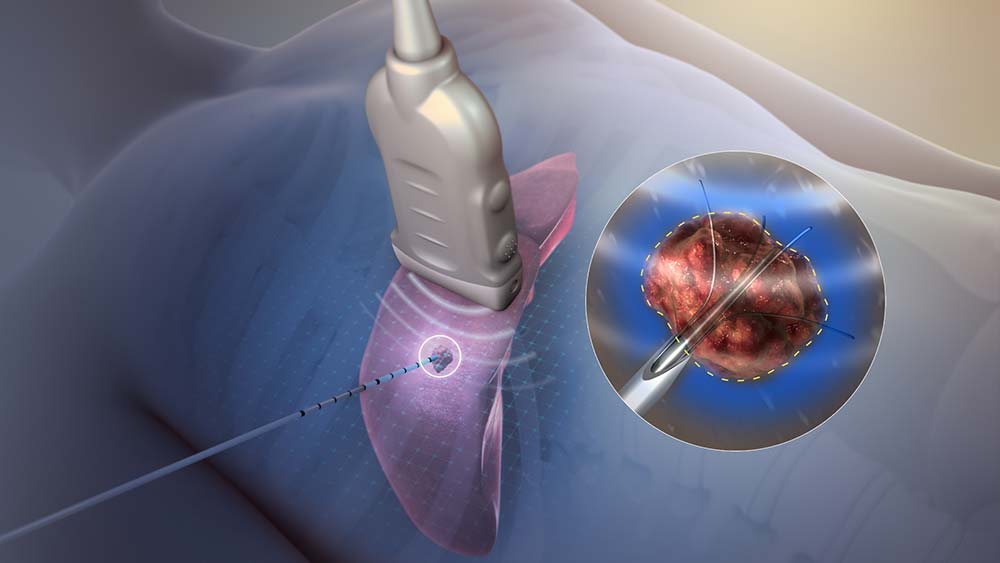Radiofrequency Ablation in Türkiye
What is heat ablation therapy?
Heat ablation is a treatment option that aims to destroy tumors and abnormal tissues in the body. Either cold fluids or very hot fluids may be used during the procedure.
How is tissue removed during a thermoablation?
Abnormal tissues are destroyed by freezing with cold fluids or by heating them with heated fluids. It is also possible to use radio frequency energies in addition to electric currents.
What are the most common methods of this treatment:

Microwave ablation:
The tip of the probe releases electromagnetic radiation to destroy tissue. A thin probe is first inserted through a small incision in the skin. Second, the position of the probe is directed using ultrasound, computed tomography (CT), or magnetic resonance imaging (MRI) to determine the area to be treated.
High energy radiofrequency ablation:
This technique is similar to microwave ablation, but radiofrequency waves are used.
Balloon thermal ablation:
In this procedure, a balloon is inserted into the body cavity filled with a fluid that has been heated to 77°C.
Cryoablation:
A probe is inserted using a thin needle and cooled with liquid nitrogen or argon gas to -15°C. Then the cold gas flows through the tip of the probe to the tissues and thus causes the formation of ice crystals on them leading to their destruction.
Why is ablation treatment performed?
Excision may be performed to treat many types of medical conditions. Some of the most common procedures include:
Catheterization or cardiac ablation:
Radiofrequency ablation or cryoablation is used to treat arrhythmias by destroying specific heart tissue.
Endometrial ablation:
This treatment is intended for women who experience heavy menstrual bleeding. It can stop or reduce abnormal bleeding, but it is not irreversible.
Excision for cancer:
Cancerous tumors of the kidneys, liver, and other organs can be treated with cryoablation or other ablation techniques.
How to prepare for the procedure?
You should not eat solid foods or drink liquids before undergoing the procedure.
Patients may need to temporarily stop taking blood thinners, such as Coumadin or warfarin.
Several tests may be performed before the procedure, such as a blood test or other diagnostic tests.
What are the steps for performing a heat ablation treatment?
Before starting the procedure, the patient is given local or general anesthesia (in some cases), then the operation area is cleansed, and hair may be removed as well. Then a small hole or incision is made through which the probe or catheter can be inserted.
In the case of catheter ablation, a balloon catheter is inserted into a blood vessel (in the groin, forearm, or neck). It is then passed through the blood vessels until it reaches the heart. Imaging may be used so that the tip of the probe or catheter can be seen while it is being inserted.
The length of the procedure varies depending on the type of ablation or the condition being treated. Catheter ablation generally takes three to six hours. The operation takes place in a hospital or outpatient clinic.
What are the advantages of this treatment?
The main advantage of this type of treatment is a shorter recovery time compared to open surgery, less bleeding and therefore fewer risks. In addition to leaving the surrounding healthy tissues without significant damage. It can also be repeated if necessary and the patient needs a short stay in the hospital. It can also be used with other types of treatment, for example chemotherapy or drug therapy.
What are the risks?
The risks of ablation therapy vary depending on the condition and its severity. However, it is considered completely safe and the risks are minimal. Complications of ablation may include:
- Bleeding from the procedure site
- infections
- scarring
- Damage to blood vessels
- Stroke or heart attack
What happens after the ablation treatment procedure?
You may have to stay in the hospital for several hours or overnight, depending on the type of procedure. Catheter ablation generally requires an overnight stay.
If you receive a local anesthetic, you may be able to go home within a few hours. You may feel nauseous or nauseous if you are given a general anesthetic. It is common to feel tired or fatigued for a few days after the ablation. The discomfort may last from a few hours to a few days.
The recovery period may vary depending on the underlying condition and the type of resection procedure.
You may have to avoid strenuous activities for some time. You should arrange for someone to drive you home if you are discharged on the same day. Ask your doctor how long you should wait before resuming normal activities.
Women who undergo endometrial ablation may experience vaginal bleeding or discharge afterwards, which may last up to three or four weeks.
Seek immediate medical treatment if you develop a high fever, excessive bleeding, vomiting, pain, or any other unusual or distressing symptoms.
Should re-excision be done in the future?
The excision procedure may need to be repeated if the condition recurs later. There may be a waiting period of three to six months after cardiac ablation or catheterization to see if the operation has been effective.
What is the long-term outlook for patients after ablation treatment?
Excision may not always be effective or may not be the best option for treating a particular condition. You may need to keep taking your medications, even if the procedure is successful. If ablation treatment isn’t effective, you may have to undergo a different type of procedure. You should discuss all available options with your doctor.
How can I book a thermal ablation in Türkiye?

- Free medical support on the phone: You will have a dedicated representative for your health condition who is always ready to answer your questions.
- Free consultation with a specialist doctor: Your medical representative will consult with a number of doctors and hospitals to find the best possible treatments.
- Free travel visa arrangement: We will contact the embassy in your country to assist you in obtaining a visa to visit Türkiye.
- Free itinerary planning: We will create a schedule for your medical trip to Türkiye.
- Free translation of documents and reports: We will translate medical documents and reports into Turkish on your behalf.
- Free support and monitoring: We will monitor the stages of treatment and be by your side every step of the way.
- Free instant translation: We will be with you during the treatment stages to provide translation between you and the medical team.
- Free accommodation and transportation coordination: We will book accommodation for you and your companions in Türkiye, along with transportation services.
Contact REHABTÜRK doctors for more information about the procedure and to evaluate your medical condition.

